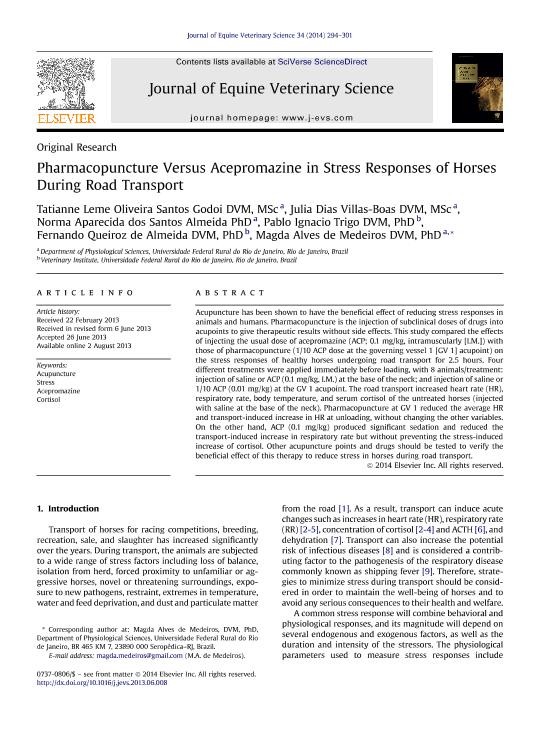Artículo
Pharmacopuncture Versus Acepromazine in stress responses of horses during road transport
Santos Godoi, Tatianne Leme Oliveira; Villas Boas, Julia Dias; dos Santos Almeida, Norma Aparecida; Trigo, Pablo Ignacio ; de Almeida, Fernando Queiroz; de Medeiros, Magda Alves
; de Almeida, Fernando Queiroz; de Medeiros, Magda Alves
 ; de Almeida, Fernando Queiroz; de Medeiros, Magda Alves
; de Almeida, Fernando Queiroz; de Medeiros, Magda Alves
Fecha de publicación:
02/2014
Editorial:
Elsevier Science Inc
Revista:
Journal Of Equine Veterinary Science
ISSN:
0737-0806
Idioma:
Inglés
Tipo de recurso:
Artículo publicado
Clasificación temática:
Resumen
Acupuncture has been shown to have the beneficial effect of reducing stress responses in animals and humans. Pharmacopuncture is the injection of subclinical doses of drugs into acupoints to give therapeutic results without side effects. This study compared the effects of injecting the usual dose of acepromazine (ACP; 0.1 mg/kg, intramuscularly [I.M.]) with those of pharmacopuncture (1/10 ACP dose at the governing vessel 1 [GV 1] acupoint) on the stress responses of healthy horses undergoing road transport for 2.5 hours. Four different treatments were applied immediately before loading, with 8 animals/treatment: injection of saline or ACP (0.1 mg/kg, I.M.) at the base of the neck; and injection of saline or 1/10 ACP (0.01 mg/kg) at the GV 1 acupoint. The road transport increased heart rate (HR), respiratory rate, body temperature, and serum cortisol of the untreated horses (injected with saline at the base of the neck). Pharmacopuncture at GV 1 reduced the average HR and transport-induced increase in HR at unloading, without changing the other variables. On the other hand, ACP (0.1 mg/kg) produced significant sedation and reduced the transport-induced increase in respiratory rate but without preventing the stress-induced increase of cortisol. Other acupuncture points and drugs should be tested to verify the beneficial effect of this therapy to reduce stress in horses during road transport.
Palabras clave:
Heart Rate Variability
,
Acupuncture
,
Stress
,
Transport
,
Acepromazine
Archivos asociados
Licencia
Identificadores
Colecciones
Articulos(IGEVET)
Articulos de INST.DE GENETICA VET ING FERNANDO NOEL DULOUT
Articulos de INST.DE GENETICA VET ING FERNANDO NOEL DULOUT
Citación
Santos Godoi, Tatianne Leme Oliveira; Villas Boas, Julia Dias; dos Santos Almeida, Norma Aparecida; Trigo, Pablo Ignacio; de Almeida, Fernando Queiroz; et al.; Pharmacopuncture Versus Acepromazine in stress responses of horses during road transport; Elsevier Science Inc; Journal Of Equine Veterinary Science; 34; 2; 2-2014; 294-301
Compartir
Altmétricas



